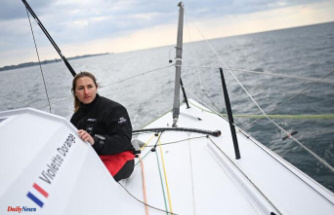Reunions in bars and restaurants, moments of celebration, hugs … The Euro football can hardly reconcile celebration and barrier gestures. As the Delta variant worries international health authorities and containment measures are taken in several countries, cases of coronavirus among football fans are increasing.
Saint Petersburg, Russia, which hosts Euro 2020 matches, on Saturday recorded the highest daily death toll from coronavirus in the country since the start of the pandemic. According to official figures, the former imperial capital, which has a population of 5.4 million, has recorded 107 deaths in the past 24 hours, a figure which Russian news agencies say is the highest of all. cities across the country since the outbreak of the virus.
Russia's second-largest city recorded 1,247 new infections on Saturday, down from 817 on June 1. Local media broadcast images of thousands of people on the streets to mark the end of the school year, with very few respecting anti-Covid gestures. The Euro matches continue, however, with half-filled stadiums, up to 26,000 spectators.
There is still one game to go in St Petersburg, a quarter-final next Friday, potentially with France if they beat Switzerland on Monday.
Russia's vaccination campaign has lagged since December amid widespread public mistrust, despite repeated pleas from President Vladimir Putin. Only 21.2 million people out of 146 million inhabitants have received at least one dose, according to figures published on Friday by the Gogov site, which aggregates data from regions and media, for lack of official national statistics.
On Friday, the Danish health authorities renewed their call for Covid-19 screening among supporters, extending it to spectators of the Denmark-Russia match, after the announcement of new infections by the Delta variant following this match.
In total, nine supporters present during the Denmark-Belgium match on June 17, against three previously announced, are affected by this variant, and four who attended Denmark-Russia. "We have always been ready to see isolated cases of infection linked to Euro matches. There is a risk when a lot of people get together," said the director of the Agency for Patient Safety. , Anette Lykke Petri, at the local agency Ritzau.
On Tuesday, the WHO was concerned about the easing of restrictions in some of the host countries of Euro-2020, after increases in cases of coronavirus around several stadiums.
The Danish selection must meet Wales this Saturday evening in Amsterdam for the knockout stages of the Euro. 4,400 of the 16,000 seats available in the Johan Cruijff Arena are reserved for supporters of the Whites and Reds. They will not have to stay in the Netherlands for more than 12 hours if they want to avoid isolation, with Denmark classified as a "high risk country" by the Dutch.
Another poster must be closely watched by the health authorities: the round of 16 on Tuesday, which will see Germany face England in London, in front of 45,000 people. In the United Kingdom, the first country in Europe to have known contaminations with the Delta variant, daily exceeds the bar of 10,000 cases. In this country, 95% of sequenced tests now correspond to the Delta variant, according to data published Friday by Public Health England.
Interviewed by the German daily Passauer Neue Presse, Doctor Frank Ulrich Montgomery, head of the World Medical Association (WMA), believes that opening the English borders for the Euro is "populism" and strongly advises against going there. , due to the risk of contamination with the Delta variant of Covid-19.
"I don't understand why Prime Minister Boris Johnson is allowing this," he adds. "Even someone vaccinated, who respects the rules of distancing but who goes to the stadium there, takes a certain risk". Traveling fans aren't most at risk, but even a vaccinated person could bring back and spread the variant when they return, he warns.












